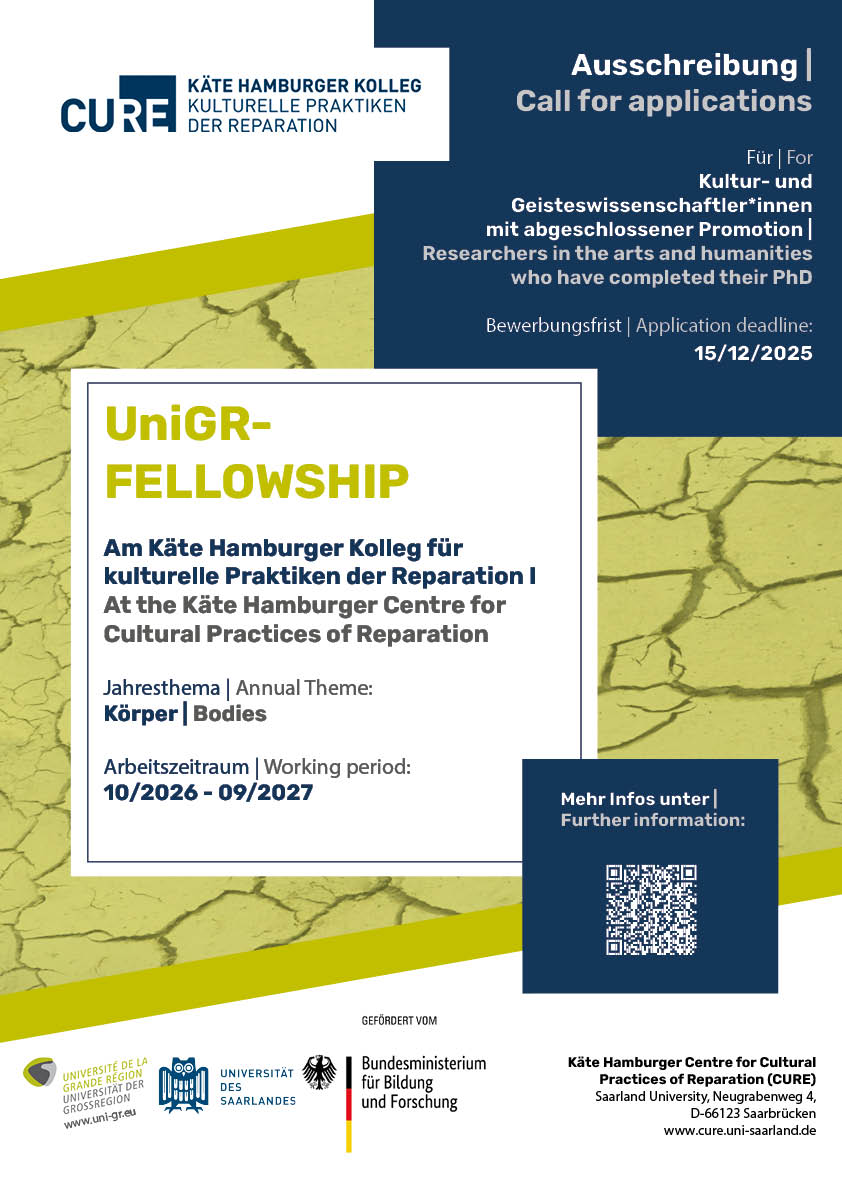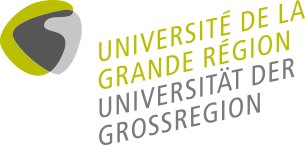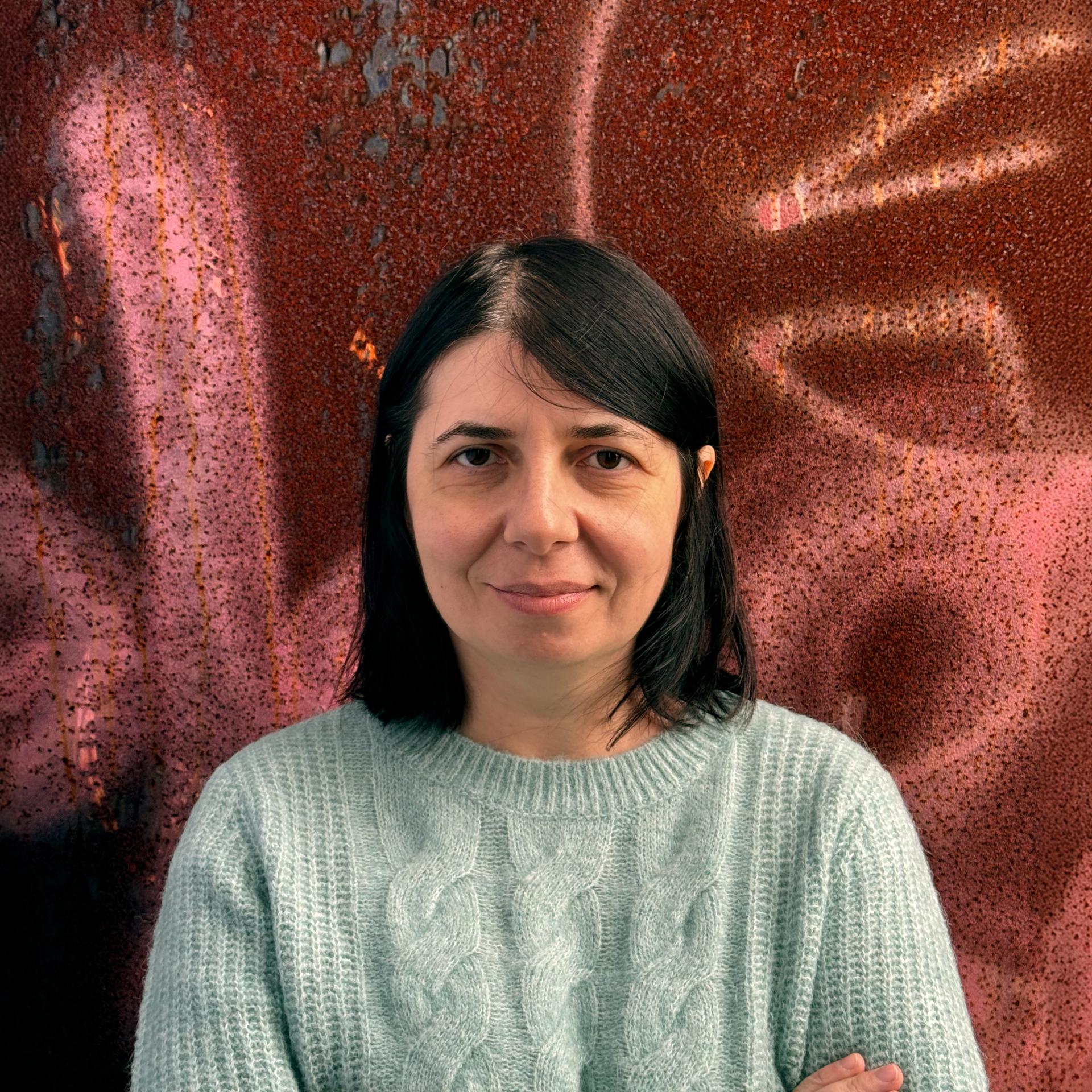The Käte Hamburger Center for Cultural Practices of Reparation (KHK CURE) at Saarland University is an institute for advanced study, funded by the German Ministry for Research, Technology and Space (BMFTR) since 2024. Each academic year, a new group of international and interdisciplinary fellows joins the centre to pursue research. For the centre’s third year (October 2026 to September 2027), we are pleased to invite applications for up to twelve fellowships with a duration of ten to twelve months (beginning in October 2026).
Research Program at the Käte Hamburger Center CURE
Questions about reparation and irreparability are at the heart of CURE’s research programme, taken up by fellows and members of the KHK CURE team from a range of disciplinary perspectives.
Many harms and damages, such as the destruction of cultural heritage in colonised regions, the trauma of war, or the consequences of climate change, cannot be undone. Such irreversible harms often trigger complex processes of negotiation that can reshape reflexive forms of cultural identity and newly imagined or created life worlds. They raise the question of how to build a shared future in which we and others can live despite a past scarred by violence, injustice, and the destruction of natural environments. Economic and legal compensation is often a prerequisite for dismantling asymmetrical situations and structures. But it is most often the case that enduring wounds suffered by individuals, and the harm done to their lifeworlds, can be addressed only through cultural and social practices.
The Käte Hamburger Centre CURE is dedicated to studying such cultural practices of reparation. We define reparation as a process of shaping the future through an awareness that past damage can never be fully undone. Repairing something always means that the traces of destruction remain – whether visible, felt, or understood – and thus gesture toward a fragility of the self. We view cultural practices of reparation as encompassing a broad range of responses to the awareness of damage: oral and written forms of narration, poetry, linguistic and non-linguistic rituals, music, visual art, films, theatre, exhibition practices, historiography, and other forms of scholarship or knowledge production. These practices aim to develop possibilities and scenarios for the future that reach beyond interests grounded in identitarian claims and the restitution of a supposedly original identity, even in the face of enduring harms. Our goal at the centre is to collaboratively develop theoretical approaches to such practices.
Call for Applications: UniGR-Fellowships in the Käte Hamburger Centre for Cultural Practices of Reparation (CURE)
 Each year, up to twelve international fellows conduct research at the Center. One of these fellowships is offered as a University of the Greater Region (UniGR) Fellowship, awarded to scholars who have completed their PhD (i.e., submitted and successfully defended by the application deadline) and are employed at one of the UniGR member universities (University of Trier, University of Liège, University of Luxembourg, University of Lorraine, and RPTU Kaiserslautern-Landau). For the third year of the program (October 2026 to September 2027), we invite applications for Fellowships with a residency of up to 12 months.
Each year, up to twelve international fellows conduct research at the Center. One of these fellowships is offered as a University of the Greater Region (UniGR) Fellowship, awarded to scholars who have completed their PhD (i.e., submitted and successfully defended by the application deadline) and are employed at one of the UniGR member universities (University of Trier, University of Liège, University of Luxembourg, University of Lorraine, and RPTU Kaiserslautern-Landau). For the third year of the program (October 2026 to September 2027), we invite applications for Fellowships with a residency of up to 12 months.
Applications may be submitted by scholars in cultural studies and the humanities who have completed a PhD (submitted and defended) by the application deadline. Applicants must also be actively engaged in research or artistic practice (including independent artists or scholars).
In addition to the above criteria, applicants for the UniGR Fellowship must hold a current academic position at the time of application at one of the following member universities: University of Trier, University of Liège, University of Luxembourg, Université de Lorraine, or RPTU Kaiserslautern-Landau. Proof of employment must be submitted along with the application materials.
The selection for the UniGR Fellowship takes place in parallel with the other advertised fellowships in the same selection process by the Academic Advisory Board.
CURE is expressly committed to diversity and welcomes applications regardless of gender, nationality, ethnic and social origin, religion/worldview, disability, age, or sexual orientation and identity.
Those without a completed doctorate, as well as members of Saarland University, are not eligible to apply.
Applications should outline an independent research project that is relevant to the research agenda of the centre and will be pursued during the fellowship. The project should align with at least one of the centres’ three thematic fields – ‘history’, ‘experience’, and ‘nature’ – and relate to the third of the four designated themes for the following academic years:
- 2024/2025: Theory
- 2025/2026: Society
- 2026/2027: Bodies
- 2027/2028: Things
Within the theme of ‘bodies’ in cultural practices of reparation, for instance, research might address issues such as bodily perception, embodiment and its performative forms, performance art, therapy, and lived practices, including questions related to experiences of individual injury or trauma.
Applications are invited only for the fellowship year running from October 2026 to September 2027. Further information on the centre’s thematic fields and annual themes can be found on the centre’s website: https://cure.uni-saarland.de/en/research/research-programme/.
Involvement and participation
Each year, up to twelve fellows conduct research at the Center, including one UniGR Fellow. Fellows are expected to live in Saarbrücken and to devote their fellowship both to collaborative work within the centre and to their independent research project. They take part in centre’s events – colloquia, working groups, conferences, workshops, and the like – and contribute actively to the centre’s own publications. With approval from the Executive Committee, fellows will also have the opportunity to organise workshops or to collaborate in teaching or other academic events with our research and cultural cooperation partners. Longer absences from the centre for extended research trips or stays are not possible.
Saarland University is distinguished by its close ties to France and its strong European focus, with programmes and partnerships such as the Cluster for European Studies (CEUS) with its overarching theme “Europe-World(s): Projections, Reflections, Transformations,” the European university alliance Transform4Europe (T4EU), and the cross-border university network “University of the Greater Region” (UniGR).
The University of the Greater Region is an innovative university grouping comprising the RPTU Kaiserslautern-Landau (D), the University of Liège (B), the University of Lorraine (F), the University of Luxembourg (LU), Saarland University (D) and Trier University (D), as well as the htw saar (D) as an associated partner. The cooperation between the seven higher education institutions in the Greater Region offers privileged conditions for study and research, focused on mobility between the partner universities and between scientific disciplines, as well as on the acquisition of language skills.
Duration and conditions
Fellowships are usually awarded for ten to twelve months, always starting on 1 October.
The fellowship guidelines of Saarland University provide two funding options.
1. Fellows who take unpaid leave from their home institution (or are independent scholars or artists) during the fellowship will receive financial compensation in the form of a stipend (at least 6,100 to 7,200 euros per month before taxes, depending on their qualifications).
2. If a fellow chooses to keep their current salary and benefits, KHK CURE will pay their home institution the equivalent salary for a teaching replacement during the fellow’s time at the centre.
Accommodation in modern apartments is provided free of charge, and accommodation for families can also be arranged if required. Similarly, the expenses for traveling to and from Saarbrücken will be reimbursed once pursuant to the Saarland Travel Expense Act (SRKG). Fellows will be provided with a fully equipped workspace at the centre.
Insurance and all other (living) costs that may be incurred must be covered by the fellows themselves.
Application Deadlines and Materials
Applications for the UniGR fellowship are only accepted from researchers who are employed at one of the UniGR partner universities (RPTU Kaiserslautern-Landau, Université de Liège, Université de Lorraine, University of Luxembourg, Trier University).
Please submit the following application materials via the application form on the Center’s website by 7 january 2026 at the latest:
- the CURE application form with abstract
- a letter outlining your motivation for applying (max. 1 A4 page)
- a CV (max. 3 A4 pages)
- a publication list
- a project outline with bibliography (max. 5 A4 pages), showing its connection to CURE’s research programme and how your research relates to at least one programme area and the annual theme
Please use minimum font size 11 and line spacing 1.15.
Applications may be submitted in German, English, or French.
Please do not include photographs.
You should receive a confirmation email after submitting your application. If you do not, please contact .
UniGR-Fellow 2024
Dr. Oana Adelina Stefan is a historian of tourism and consumption during the Cold War with a particular focus on socialist Romania and Franco’s Spain. She gained a PhD in History from the University of Pittsburgh, United States. She was a Humanities Initiative Fellow at Institute for Advanced Study at Central European University in Budapest and held positions at European University Institute in Florence and The Centre for Contemporary and Digital History at University of Luxembourg. Her latest book, Vacationing in Dictatorships: International Tourism in Socialist Romania and Franco’s Spain was published with Cornell University Press in December 2024.
Research topic at the Käte Hamburger Centre: Cultural Reparations in the Cold War: Socialist Romania and the Global Circulation of Cultural Objects, 1950s-1980s.
You can find the profiles of the other 11 Fellows residing at the Centre on the CURE-Website.
Photo: ©Anna Warum, CURE
Contact
Please find more information about the KHK CURE on their website: https://cure.uni-saarland.de/fellows/call-for-application/.
We will notify applicants by the end of April 2026. Until then, please avoid inquiries about the status of your application.
If you have any other questions, please feel free to contact the centre by writing to cure@uni-saarland.de.
As part of your application for a fellowship at the Käte Hamburger Centre for Cultural Practices of Reparation (CURE) at Saarland University (UdS), you will be submitting personal data. Regarding our use of personal data, please see the university’s privacy policy in accordance with Art. 13 of the General Data Protection Regulation (GDPR) regarding the collection and processing of personal data. By submitting your application, you confirm that you have read the UdS policies on data privacy and protection.





